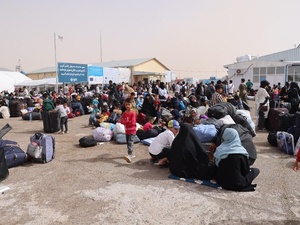Ruling highlights problems skilled refugees face finding work in Canada
Ruling highlights problems skilled refugees face finding work in Canada

Fatima Siadat loves teaching, but has had trouble getting her Iranian qualifications recognised in Canada. Her recent court victory could soon see her returning to the classroom full time.
OTTAWA, Canada, January 17 (UNHCR) - After a 13-year legal battle, former refugee Fatima Siadat earlier this month moved a huge step closer to winning the right to teach in the Canadian province of Ontario.
The Ontario College of Teachers had long blocked the Iranian from teaching in public-funded schools because she could not produce original or government-certified documentary proof of her academic qualifications. The Superior Court of Ontario, however, ruled that the regulatory body had violated her human rights and ordered it to reconsider her application.
The court's precedent-setting decision, released on January 10, has given heart to other immigrants and refugees, who have complained about what they see as discrimination from professional bodies in Canada that refuse to recognise their foreign credentials without documentary proof. Many highly qualified people end up taking low-paid, unskilled jobs as a result.
"I hope it will open doors for others so that they won't have to go through this struggle," said an elated Siadat, who is now a Canadian citizen and lives in Ottawa. "It makes me feel so good and inspired to help others."
Lawyer Chantal Tie, while praising Siadat's "courage and staying power," said the UN refugee agency had made a large contribution towards the court victory. "The affidavit submitted by UNHCR in support of Fatima's appeal was essential in helping us to argue this case," she said.
Under current regulations, anyone wanting to teach in public schools in the province must get a Certification of Qualification from the Ontario College of Teachers. But the college insists on original or government-certified copies of credentials and refused to accept photocopies and employment records from Siadat, or consider other ways of determining her qualification for certification.
The only way to get the required documents would be to apply to the authorities in Iran who had deliberately withheld them. "I had constant arguments with education officials," recalled Siadat, who fled into exile in 1989 with her young daughter after she was fired, threatened and summoned for trial after teaching high school students that authors had a right to freedom of expression.
The UNHCR affidavit argued that the college's demand was unreasonable. It said many refugees feared putting their families in danger if they contacted the authorities in their home countries and also noted that "some authorities deliberately penalise refugees by refusing to issue them with required documents."
In her original asylum claim after arriving in Canada, Siadat had mentioned the withholding of her official documents and said this was aimed at preventing her from teaching again. The Superior Court found that the Ontario college should have given more weight to Siadat's "unconventional" circumstances and said it had been "uncompromisingly stringent" in its demand for original documents.
The UNHCR affidavit presented before the court said that in cases like Siadat's, refugees should be allowed to submit secondary evidence that would corroborate their claimed qualifications, or explore other ways to assess credentials such as sitting for a standard examination.
Lawyer Tie said the three-member court had considered Canada's obligations under the 1951 UN Refugee Convention and the 1997 Lisbon Convention on Recognition of Higher Education Qualifications, which promotes a flexible approach when evaluating personal credentials.
"The decision in this case has broad implications for many refugees trying to get credentials recognised, as it places responsibility on a range of regulating authorities to accommodate the refugees' special circumstances by developing individualised methods for assessing their qualifications," Tie said.
"This ruling deserves to be carefully reviewed by governments and professional bodies across Canada," added Elizabeth McWeeny, president of the Canadian Council for Refugees. "The legitimate goal of evaluating foreign credentials needs to be achieved in a flexible way that takes into account the fact that some refugees who have the required qualifications will not be able to provide full documentary evidence."
The Ontario College of Teachers could still appeal the ruling, but Siadat now sees on the horizon her cherished dream of working as a full time primary school teacher. "When I start my job as a public school teacher, I will send you all an invitation to attend my first day," she laughed.
By Nanda Na Champassak in Ottawa, Canada







